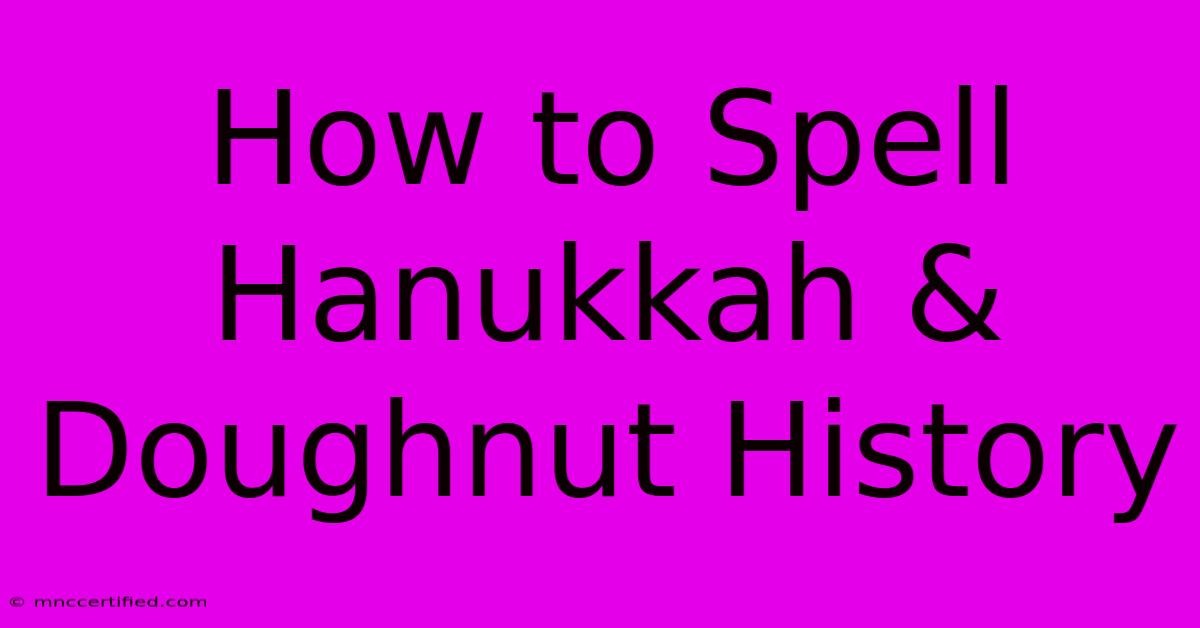How To Spell Hanukkah & Doughnut History

Table of Contents
How to Spell Hanukkah & Doughnut History: A Sweet Celebration
Hanukkah, a joyous eight-day Jewish festival, is often associated with delicious treats like latkes and sufganiyot (jelly doughnuts). But before diving into the delightful history of these fried delights, let's address a common question: How to spell Hanukkah?
Spelling Hanukkah: Conquering the "K"
The correct spelling is Hanukkah. It's easy to get tripped up, but remember the double "n" and the final "h." Common misspellings include "Chanukah" (which is also an acceptable spelling, reflecting a different transliteration of the Hebrew) and variations with single "n"s. Using the correct spelling is crucial for SEO (Search Engine Optimization) when writing about the holiday. Getting it wrong could lead to your article not being found by those searching for information on Hanukkah.
The Sweet History of Doughnuts: A Global Treat
While latkes are a traditional Hanukkah food with their own rich history, the connection to doughnuts is a more modern, albeit delicious, one. The history of doughnuts themselves is surprisingly complex and spans the globe.
From the Dutch "Olykoeks" to American Doughnuts
The story often begins in the Netherlands with olykoeks, which translates to "oil cakes." These were fried dough balls, similar to what we know as doughnuts today. Dutch settlers brought this tradition to North America, and the doughnut slowly evolved.
The Hole Story: How Doughnuts Got Their Hole
The iconic hole in the center of the doughnut wasn't always there. Legend credits Hanson Gregory, a sailor, with punching the hole in the center to allow for more even cooking. This innovation made the doughnut lighter and less greasy, significantly improving its taste and appeal.
Doughnuts and Hanukkah: A Modern Marriage
The connection between doughnuts (specifically sufganiyot) and Hanukkah is relatively recent. While fried foods are traditionally associated with the festival (symbolizing the miracle of the oil), the adoption of the jelly-filled doughnut is thought to be a post-war phenomenon, likely stemming from the increased availability of ingredients and global culinary influences.
Sufganiyot: The Hanukkah Doughnut
Sufganiyot are the quintessential Hanukkah doughnut. These deep-fried treats, filled with jam or other sweet fillings, are a significant part of the holiday celebrations in many Jewish communities worldwide. Their popularity has cemented their place alongside latkes as a key part of Hanukkah's culinary traditions.
Optimizing Your Hanukkah and Doughnut Content for Search Engines
To ensure your article about Hanukkah and doughnuts ranks well on Google, consider these SEO best practices:
- Keyword Research: Use tools like Google Keyword Planner to identify relevant keywords such as "Hanukkah recipes," "sufganiyot recipe," "Hanukkah traditions," "history of doughnuts," and variations thereof.
- Keyword Placement: Naturally integrate these keywords throughout your article in headings, subheadings, body text, image alt text, and meta descriptions.
- On-Page Optimization: Optimize your title tags, meta descriptions, and header tags (H1, H2, H3) with relevant keywords.
- Off-Page Optimization: Build high-quality backlinks from reputable websites. Share your article on social media and engage with readers in the comments section.
- High-Quality Content: Create engaging, informative, and well-structured content that provides value to readers.
- Image Optimization: Use relevant images and optimize their alt text with keywords.
By following these tips and focusing on creating high-quality, informative content, you can significantly improve your chances of ranking well in search results for queries related to Hanukkah and the delightful history of doughnuts. Happy writing!

Thank you for visiting our website wich cover about How To Spell Hanukkah & Doughnut History. We hope the information provided has been useful to you. Feel free to contact us if you have any questions or need further assistance. See you next time and dont miss to bookmark.
Featured Posts
-
Billy Mongers Crash Dj Girlfriend
Dec 26, 2024
-
Health Workers Praised Unity Sought After Riots
Dec 26, 2024
-
Vogue Williams Reveals Marriage Setback
Dec 26, 2024
-
Nfl Kelces Dunk Penalty Explained
Dec 26, 2024
-
Live Chanukah Menorah Lighting Tampa
Dec 26, 2024